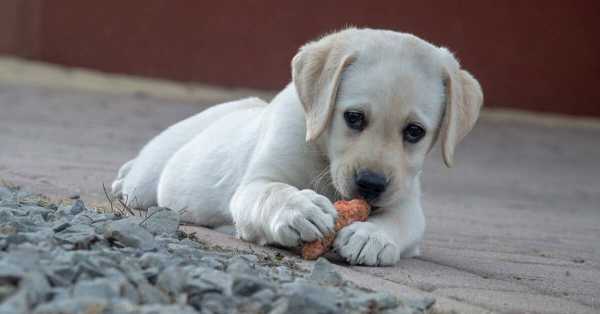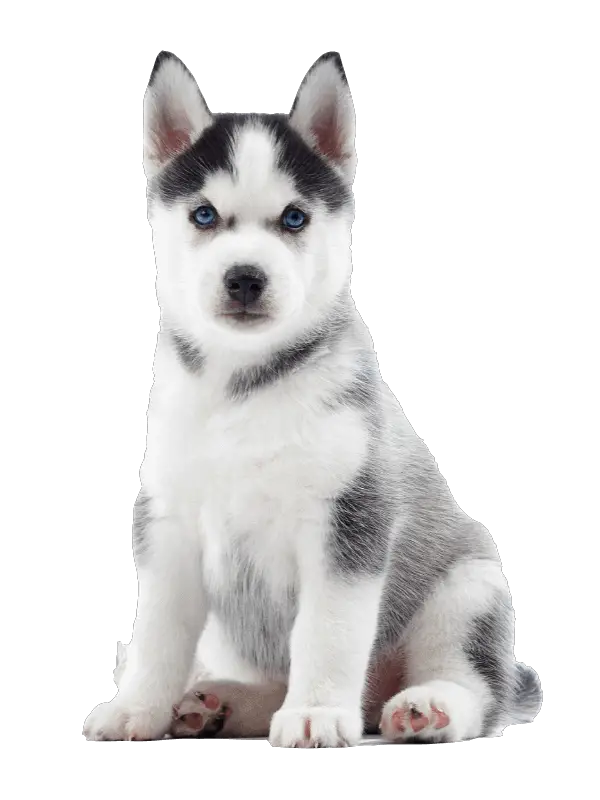Are you trying to figure out if your puppy is ready to move on to adult dog food? As an avid dog walker, I have been able to see the development of many pups, from small to large dogs.
It is important to make sure your dog is getting the right nutrients from their food in order for them to develop correctly.

If your puppy does not have the correct proteins and level of carbohydrates, they will be unable to develop proper brain function and their muscles will not form correctly.
To learn more about your puppy’s development, Pedigree have some really useful information on their website here.
Puppy Food Vs Adult Dog Food
Your puppy is much more energetic and playful than an adult dog, which means their food needs to be full of nutrients. Their food needs to have higher protein content, calories, and nutrients in order to keep up with them and encourage healthy growth of bones and teeth.
Adult dog food is lower in calories and has a lower level of proteins because adult dogs no longer need such high contents. It is actually very bad to give your grown-up dog food designed for puppies as they will run the risk of becoming obese or facing other health issues. For more information, check out this article.
Learn More: How Do I Get My Dog On A Feeding Schedule?
Keeping Your Best Friends Safe
The Association of American Feed Control Officials (AAFCO) produce the standards for which a puppy and adult dogs’ food must differ.
They provide advice on various stages in your best friend’s life to help you ensure they are getting the best nutritional content for them possible.
Counting Calories
While calorie content is important for your pet, it should not be the only consideration when looking for a suitable food. Vets can help you to determine how many calories your best friend should be consuming with regards to their weight, breed, age, and activity levels. Just like a human!
Bigger Pups
As we know by now, not all puppies should move on to adult food at the same time. There are so many differences that need to be considered and one of those is their breed.
If they are a large breed, then they are going to need the nutrients and high levels of proteins from puppy food for longer in order to grow healthily. This video gives an easy explanation of your puppy’s needs depending on their size.
Check: How To Choose Best Dog Food For Large Breeds?
Looking At the Switch
So, your puppy has grown for a little bundle of fur and is using plenty of energy every day to learn new things. From walking dogs of all sizes, I know how important it is to ensure they are getting the right nutrients in order to grow properly. It really does depend on the breed of dog and their size as some breeds use energy differently to others.
Small to Medium Pups
No matter how much you want your best mate to stay a puppy forever, at around one year a small to medium breed pup is considered an adult.
Yes I know, it feels like yesterday that they barked for the first time but really, at around one is when you should consider making the switch to regular adult food.
The Giants
So, you’ve opted for a bigger dog breed because you can’t wait to have a big lump keeping your feet warm in the winter, I get it. Bigger breed dogs tend to take longer to grow, as they’ve got more growing to do. At around 18 months to 2 years old, your dog will have reached maturity.
Larger dogs can vary in weight quite a lot so when you are thinking of making the switch, it would be worth asking your vet to be sure. I found some relevant information on different size breeds here.
Read: Difference Between Foods For Regular Dog Breeds And Giant Dog Breeds
Making the Switch
Changing the Routine
Not only will you be making the switch with the food you give your dog but you will usually have to change how often you feed them too. This can really mess with your pup’s routine so make sure to ease off slowly.
Most dogs that I walk started their puppy life eating three meals a day and then their owners cut them down to two, then half portions of adult dog food twice a day. This way your pup won’t be hungry and their routine won’t send them into a panic.
Watch them Grow
Once you have managed to change your pup’s routine, you may feel the need to watch every portion that they eat. Many sites suggest this and food brands will definitely suggest it but really, it is about each individual dog. Watch your dog’s weight and how it is distributed and watch their eating habits. Some dogs may leave their food and come back to it later, this may mean they don’t need quite so many meals.
If you have a Labrador though, they will just eat anything so be careful! If you are unsure whether your dog’s weight is right, here is a useful guide. A really interesting product I found to help slow down your dog’s eating and avoid gastrointestinal problems are bowls like this one on Amazon and this bowl which looks like a lot of fun for your energetic dog.
Slow and Steady Wins the Race
It is important that you don’t shock your poor dog by completely changing their food straight away. Start the transition by adding a small amount of adult food into their usual meals; then wait.
If you don’t face any issues when you are out on walks and you don’t hear any tummy gurgles after they have eaten, try adding a little extra the next day and so on. Your pup’s tummy will tell you what it needs so if you do find a little upset, slow down the transition again. Check out this article for more information on weaning.
If all is well with your pup’s tummy, then you should expect to be able to make a full change to adult dog food in just over a week. Don’t worry if it takes a little longer, every dog is unique. Just make sure you don’t upset your dog’s insides because you will know about it!
After all, the main goal is to make sure your best friend is comfortable and happy and getting exactly what they need.
Popular Reading: Why Your Dogs Need Low Sodium Dog Foods?
Things you Want to Find in your Dog’s Food and Things you Don’t
Whether you decide to go for a dry food or a raw food, it is important that you make sure the content for your dog is right. Many dry foods can be higher in calorie content and carbohydrates, which for some dogs, is not ideal. So I’ve added some information below on the things to look out for and I found this article to be really helpful.
Bags of Protein
Dogs of all ages and sizes are best fed with a high protein diet which should include meat or fish. Any dog food purchased should be packed with high-quality proteins so you should look for ingredients such as beef, fish, chicken (de-boned of course), lamb, duck, or pork. High-quality protein products such as these will also have a high-fat content which is ideal for your canine friend.
For a load more information on top-quality ingredients, check out this article on balancing food ingredients for your pup.
Wasteful Extras
Dogs do not benefit from a meal with a load of additives. If you are feeding your best bud, make sure it isn’t a product full of grains which have no nutritional value for them at all. Grains act as a bulking agent for your pet so it will fill them up quickly but they will not gain anything to help their health.
Also make sure to look out for additives as you don’t want to rush your pet to the vets if they have an allergic reaction to an unnecessary ingredient!
Food Safety
It is always worth checking where your dog’s food has been made. Try and look out for food made in countries with high food standards and policies. Avoid food anywhere outside of the US, Australia or Western Europe as it will be hard to tell whether anything additional and harmful has been in contact with your canine companion dinner.
You Might Find This Rank
Just because you wouldn’t eat it doesn’t mean it isn’t something your dog may benefit from. By-products and meat-meals are an okay addition to your dog’s food but be careful to make sure you know what animal it has come from.
After all, neither you nor your dog wants any nasty surprises. If you want to know more about animal by-products, Pedigree has some great information.
Learn: What Foods Are Good And Bad For Dogs To Eat?
Adult Dog Food: FAQs
# Can You Give Your Puppy Adult Food?
It isn’t recommended that your puppy eats adult dog food regularly, but I have had situations where I haven’t been able to get hold of any puppy food and I’d rather my dog didn’t starve.
She handled it fine in small amounts and didn’t experience any tummy issues, but again, I don’t recommend you do this too often.
# What Other Foods Can Puppies Eat?
Another alternative to weaning your puppy off their puppy designed food is to feed them a “for all life stages” food.
This food is designed to meet the nutritional needs of your dog at all stages of their life, whether they are growing or whether they are maintaining their adult size.
This is a nice easy way to avoid changing their food over at the right time. For more information, check out this article.
People Also Liked: What Are The Important Qualities In Dog Food For Yorkies?
What have you found most helpful?
So, I’ve bombarded you with information to help guide you, but which part have you found the most helpful?
It has been incredibly helpful for me to collate this information as now I can understand more about the varying dog breeds that I get the pleasure to walk.
Have you tried any of the ideas I have shared and what did you think? I would love to hear your experiences in the comments section. Please also share any other useful tips that I may have missed!
If you enjoyed this article, please share with your friends so we can ensure all pup owners are well informed!
Other Dog Food-Related Topics
1. Can Dogs Eat All Types Of Radishes? What You Need To Know!
2. Best Dog Food For Golden Retriever
3. Top Dog Foods For Maltese With Tear Stains
4. Best Dog Food For Beagles
5. What Are The Best Dog Food For American Bully?
6. Best Dog Food For Great Danes
7. Best Dog Food For Pomeranians
8. Can Dogs Eat Edamame?
9. Best Dog Water Fountains & Dispensers (For Indoors & Outdoors!)
10. Can Dogs Eat Sunflower Seeds?
We have partnered with HungryBark.com to offer the best deal on high quality dog food to our readers. If you click on the button below, we will take you to their exclusive discount page.


